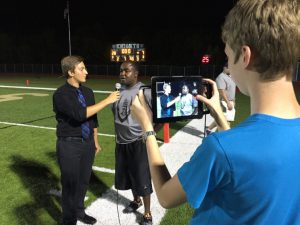Jake’s Take: In Defense of Sports Journalism
Published: May 19, 2017

Preface: This is the last installment of the weekly(-ish) opinion column “Jake’s Take,” which has run on FHNgameday.com since Feb. 14, 2014 with this piece detailing the Cardinals’ season-long outlook for 2014. I would like to thank all of those who have given me feedback on my articles throughout the years, and in case you missed the very beginnings of “Jake’s Take,” you can view the entire archive here. It is simply incredible that I’ve been able to write more than 60 articles that are are just me yelling my opinions through a keyboard. Every reader for the past three-plus years has contributed to my decision to pursue a career in sports reporting and broadcasting. So, for this last piece, I’d like to give back to the entire sports reporting community and provide them with a sort of guideline, reminder why we do what we do. Again, I cannot thank you all enough for your support. I’m going to miss scholastic “Jake’s Take,” but look for the blog to continue at jacoblintner.com beginning this summer.

“Keep politics out of sports.”
“Sports don’t really matter.”
“You really think you can make a living as a sports journalist?”
“You’re wasting your talent.”
I’ve heard it all in my time as a self-proclaimed sports journalist. From questioning the field as a whole to berating journalistic organizations, there is an indefatigable stigma against sports journalism as a viable career path.
Sports journalism is my passion. Sports are the reason I helped found FHNtodayLive. Sports are the driving force behind fatherly love worldwide. Sports are many people’s reason for living.
My mission for the past four years as an editor and leading figure of FHNgameday.com has been to remove this stigma, to show that sports journalism isn’t just mindless previews and recaps, to show that sports journalism is far more wide-reaching than its fans.
That is why I’ve taken each of the above criticisms to heart and why I will refute each claim below.
“Keep politics out of sports.”

This isn’t really a criticism of the field, but that doesn’t make it any less of an idiotic statement. The North American sports industry is on its way to surpassing $73 billion in revenue in the next few years, which would place solidly in the top five entertainment industries worldwide.
That’s excluding five of the six populated continents.
The estimated value of the global sports industry is nearer to $600 billion, easily the most valuable sect of modern society. Wouldn’t it make sense for a group that is this impactful to have some political clout?
This is especially true given that athletes are forerunners in human rights issues. Whether it is Colin Kaepernick or LeBron James or Dexter Fowler, athletes across all major sports are expressing not only an interest in political activism but a desire to make a change in a country that they see unfit for the next generation.
While a scoreboard is as politically objective as they come, the modern-day sports world is anything but. The New York Jets’ owner is the U.S. ambassador to the United Kingdom. So, for those clamoring to keep politics out of sports, we can’t. It is no longer possible to live in a world in which athletics and politics operated in entirely separate spheres, and that’s not necessarily a bad thing. More on that to come.
“Sports don’t really matter.”

Where to begin with this one? I would first like to refer to the above argument, but if that doesn’t convince you, then I suppose I’ll continue.
… You’ll have to excuse me if I take a moment to answer this claim. It simply astonishes me that someone can be so utter out of touch with societal foundations. Whoever says this clearly never took AP World History with Mrs. Coil at FHN; otherwise, they would know the importance of sports in society throughout the ages.
Entire civilizations were built upon feats of athleticism. The Roman Empire. The Mayans. The Greeks. The Egyptians. Every incarnation of a unified Chinese state. The common factor between all of these societies was the significance of sports to the core of daily life. Be they for religious reasons, for social or political power or simply for leisure, athletics have been the backbone of civilization for millennia.
Even nowadays – especially nowadays – sports play a remarkable role in society. As a reward for decades of hard work and dedication, even the most financially disadvantaged youth can become millionaire in the sports industry. And when sports aren’t facilitating one of the most common methods of fiscal fluidity, they’re giving hope and camaraderie to millions more who engage in anything from Little League to the Majors to adamant fanaticism.
Think about that: A fan of a major-market sports team in North America immediately has a connection to 10 million or more people who think the same way. This awesome innate ability of sports to bring people together is what makes them so impactful both throughout human history and, in an age in which other facets of life are dividing people more than ever, today.
“You really think you can make a living as a sports journalist?”

This article does not give me hope for my future financial situation. On a related note, this is the one of the few arguments that I have difficulty fighting. No, sports reporters and broadcasters are nowhere near the top of the income brackets, but that doesn’t matter. As a young American citizen, I was taught that I can accomplish anything if I put my mind to it. I know that’s true because Mom told me so.
That being said, my expected average salary is still well above the poverty line, which is good enough for me. At the risk of sounding like every compassionate adult, if you love what you do, then you’ll never work a day in your life. That’s how I choose to look at my future financial situation. Sure, I could look for a career in a STEM field and make six figures, or I could make a difference in people’s lives as a journalist, which I see as much more rewarding and, more importantly, less math-y. And if I happen to make enough money to afford Ramen noodles and a night eating out at Taco Bell every week or so, even better. The important piece here is that money can only take you so far and that it is much better to do what you love than to chase wealth.
“You’re wasting your talent.”

I. Hate. This.
There is nothing worse to tell anyone than that their chosen career path (or any decision) is a waste. Mentally, and if I were to put forth the effort, I could turn my straight-A’s into nearly any degree I wished. I also feel that I’m a competent enough musician to go into that field as an educator (a step below those gifted enough to earn performance degrees).
Why then, with all this potential, would anyone go into sports journalism?
Well… I can’t really give a straight answer to that question because, to be frank, I don’t know myself. The only basis of knowledge I have for choosing this career path is that it is my passion. I am intrinsically motivated to produce fair, accurate and engaging content that conveys the breaking news of the day. There is nothing I take more pride in than a well-written story or a live broadcast that goes smoothly, and the numbers of both of these have increased dramatically as the years have passed.
Above all else, one’s personal decisions concern no one else.. Not casual passersby, not colleges or universities, not the man speaking so loudly into his cell phone that I can hear him from across the library. Some see utilizing intelligence and acute logical reasoning in the field of journalism is not practical or beneficial. I see it as using one’s skill set to contribute to the betterment of the industry.
I firmly believe that I will revolutionize sports broadcasting within my lifetime because I also believe that it is necessary for one to have self-confidence before anyone else will jump on the bandwagon. This is why some find me arrogant. It’s understandable, really, because self-esteem has gone nearly extinct in America these days.
With all of the above in mind, I have but three requests in this call-to-action:
First, trust in your own abilities. Regardless of where you are in life, it is never too early or too late to better your existence. I realize it likely sounds facetious – maybe even laughable – for an 18-year-old to give life advice on the Internet, but that’s the world in which we live. I can’t argue against that point, but this is my blog, so I’m going to write what I feel like writing.
Second, support others’ dreams. No one person is ever in a position to judge or belittle anyone else, and no one dream is objectively better than any other.
Lastly, be good to one another. This is Rule No. 1 in the FHN Student Media PubHub, and I would be remiss to finish off this series without shouting out the PubHub. This one rule, while it initially sounds comical, carries with it a deep meaning. If we had more love and support in this country, we would’ve realized our destructive path long ago. Now, we reap what we sow. It is up to the forthcoming generation – those who, like myself, will be attending college in the fall – to make up for lost time and begin loving again.
I could go on for pages, but I will leave you with this:
Be good to one another.
Thank you.

Jacob Lintner
Jake From “Jake’s Take”
2017 Missouri Student Journalist of the Year









![FHN's Rescheduled Prom At Old Hickory Country Club [Photo Gallery]](https://FHNtoday.com/wp-content/uploads/2025/04/IMG_9932-48-300x200.jpg)
![Varsity Boys Volleyball Fall Short Against FHC [Photo Gallery]](https://FHNtoday.com/wp-content/uploads/2025/03/IMG_0453-300x200.jpg)
![Girls Varsity Soccer Falls to Liberty High School [Photo Gallery]](https://FHNtoday.com/wp-content/uploads/2025/04/03.27_GirlsSoccer_JDelapaz-15-300x200.jpg)



Dennis Nail • May 19, 2017 at 11:58 am
My good friend Jerry Lintner is so proud of you, as he should be. Follow “your” dream to be the best sports journalist you can be, and don’t let anyone deterred you from your objective. I have a problem with a lot of things that are reputed to be “sports journalism,” So I’m counting on you to “write the ship!” And, I share your confidence in your abilities! Best of luck.